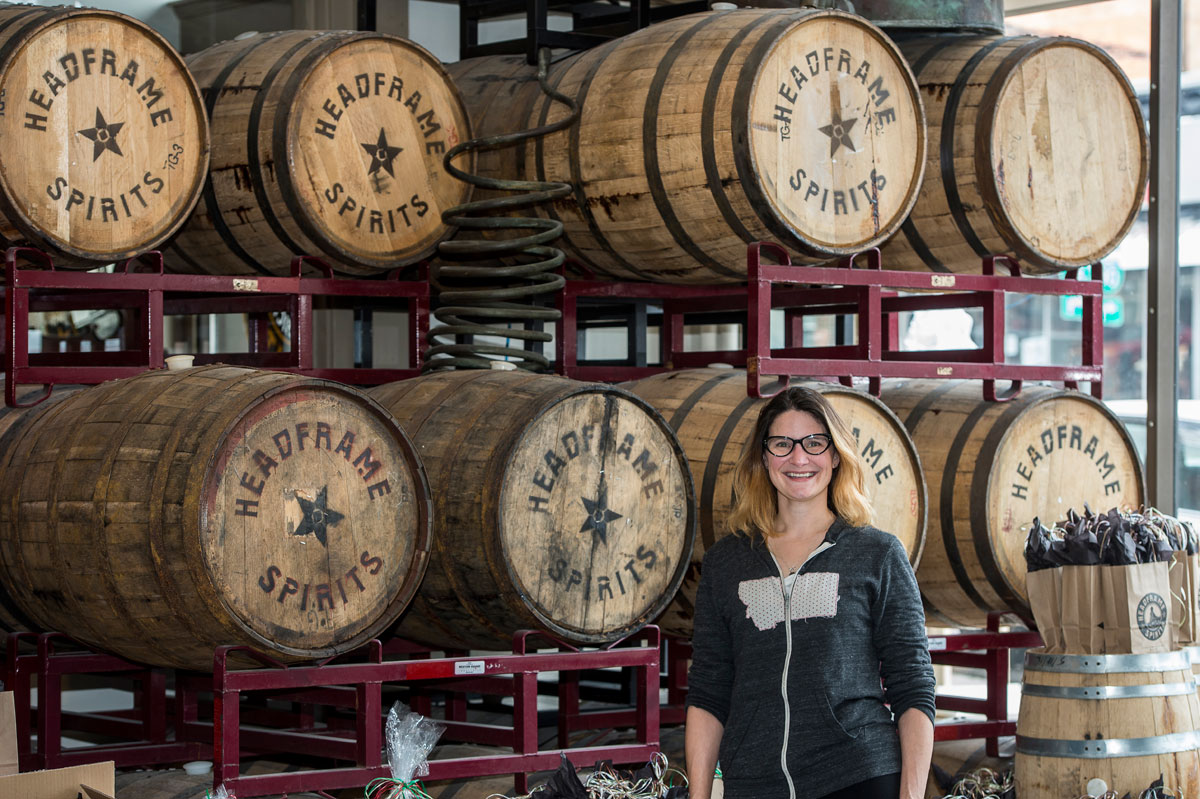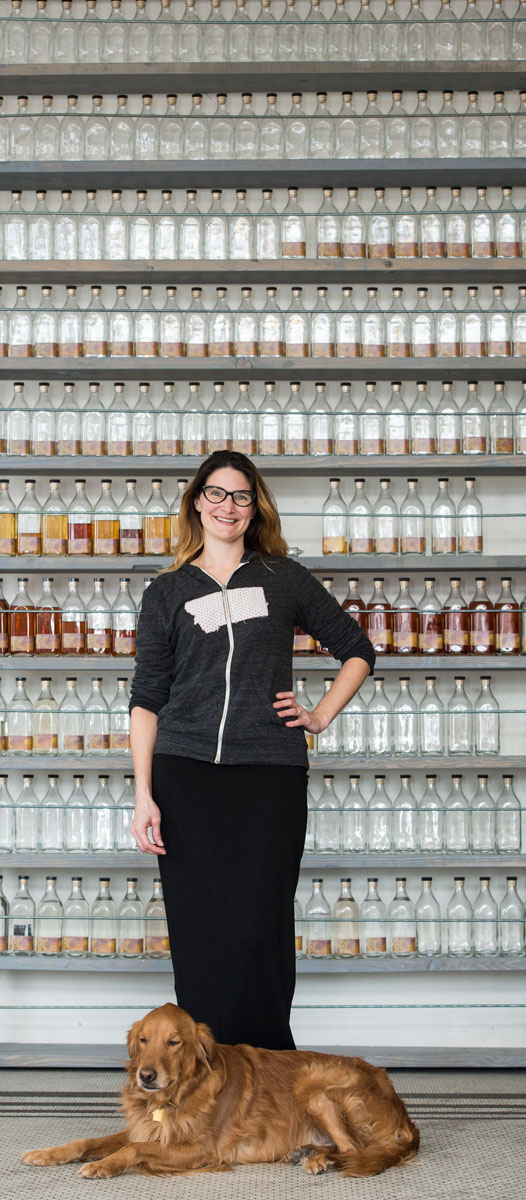- Editorial Offices
- 325 Brantly Hall
- Missoula, MT 59812
- (406) 243-2488
- themontanan@umontana.edu
- Icons By Maria Maldonado

Courtney McKee refuses to be defined by boundaries. Along with her husband and fellow UM alum John McKee, the English Literature major founded and currently owns Headframe Spirits in Butte, soon to be the largest distillery west of the Mississippi River. The Connecticut native also is the founder of Butte Innovates, a nonprofit that promotes economic development in the town for which the organization is named. Recently, she visited UM to showcase The Orphan Girl, a short film funded by Headframe Spirits that highlights the proud and gothic mining culture of Butte, America.
Before we get started, can I be completely honest with you?
Of course.
Are you sure?
Absolutely.
Okay. Here it goes. The thing is, I just really love Orphan Girl Bourbon Cream Liqueur.
Ha! It is unique. In the industry there aren’t a lot of similar products. We actually developed it to encourage people to come to our tasting rooms. We thought folks that don’t like the real hard stuff— the whiskey, gin, and vodka—would probably appreciate having something a little milder. We had no idea it would be as successful as it is.
Come on. Everyone knows Orphan Girl tastes like a magical ice creamy dreamscape from which I never want to wake up. You really had no idea it would be successful?
Put it this way: It makes up a much greater percentage of our sales than we anticipated. It actually outsells Baileys Liquor in the state of Montana. That’s really exciting. I don’t have the exact numbers in front of me, but I don’t think Baileys has ever had competition like that in a state. In order to capitalize on this success, we wanted to roll out a nationwide campaign. The only catch was that we’re a pretty small team at Headframe. We don’t have a lot of bodies we can throw at a marketing campaign.
What is your approach to marketing?
So much in the spirit business is “pay-for-play.” Like when you buy twelve cases of our spirits, we’ll give you the thirteenth for free. That’s not a conversation John or I have ever cared to engage in. If our product is great and you like it and your audiences like it, then you should carry it. If not, then don’t. You’ll never see us put out anything that says, “Here. Come buy this.” Because anyone can say, “Come buy this.” We like telling stories.

And was it that affinity for storytelling that created The Orphan Girl short film?
The passion for storytelling is something John and I share. I’d like to tell you that we have some big strategic plan behind the storytelling, but honestly 90 percent of the good things that have happened for Headframe have happened by accident. I don’t say that in the sense that it’s coincidence or luck. It’s that we don’t operate inside of boundaries.
The Orphan Girl product was named after the Orphan Girl Mine. We found this picture of a little girl standing on an ore cart. There are these miners sitting on either side of her, and she’s just standing there in a little white dress. This really is a photo from Butte’s past, and we have no idea who she is or why she’s there. So we started building a backstory on her because she’s the face of our Orphan Girl product. Her picture is on the label. So it all started with storytelling, figuring out who she was and why she was in Butte. And as we were in the process of making a short film about Butte’s past, I came to the realization that we need to start turning the narrative to focus on Butte’s future. That’s the really exciting aspect of what we’re doing, now. All of my efforts are currently focused on the economic development of Butte, which is what the Spirit of Butte campaign and the Butte Innovates nonprofit are really all about.
How did you end up at UM?
It was very far away and seemed very romantic, very pioneering for a girl from Connecticut to move to Montana to create the distance that I wanted from the things that were familiar.
What was your first impression when you arrived on campus?
I got here two days before classes started, pulled up outside of what was then Freddy’s Feed and Read over on Helen Avenue, went to the pay phone—because this was a long time ago—and I said, “I made it! I’m sitting here on a bench, and I’m looking up at the hill over here, and there are freaking hang gliders, and it’s so beautiful.” And it was one of those moments, you know? One of those perfect moments when I knew this was where I was supposed to be.
And from there you went right in to the English Department? I was always a reader. Not necessarily a creative writer, but I’ve always loved books.
Because of your passion for storytelling?
Because of 1950’s American literature—the Jack Kerouacs, the Allen Ginsbergs—it just resonated. It connected with me as a person. These were books you’d read, and your heart would be racing because you were there. You were so wrapped up in the experience of being there, experiencing the angst of a midcentury world that doesn’t fit you, the experience of pushing boundaries.
Is that why you’ve called your decision to major in English Literature “the perfect foundation for every job you’ve had since?”
The English degree was perfect because it taught me how to learn. It taught me a degree of self-confidence and to dig into things that I’m passionate about. I’ve learned since that I don’t have to limit my passion to one thing. I can put my passion and energy into all of these different areas. My husband calls it hobby-hopping. I call it engaging with the world. I think that’s a wonderful thing. I’ll be a student for the rest of my life. I love not having an M.B.A. because from a business standpoint there’s no definition telling me what I should be doing.
You and John were named Montana Entrepreneurs of the Year for 2013. Headframe Spirits currently is seeking a major upgrade to its facilities to make it the largest distillery west of the Mississippi River. How is it that you both continue to make entrepreneurship look so easy in Montana?
Honestly, part of the answer is that I believe any good job should resonate with you as a person. When we hire at Headframe—we have about twenty-seven employees right now—we don’t hire for degree, or even for a skill set. We hire for talent. We hire for passion. We hire for innate talent, the things that make you who you are, and build you a job that fits you as a person. Because that’s how you really keep an engaged workforce—you hire people to do what they love.
Who was your favorite faculty member at UM?
Stewart Justman was a fun professor. Mike Mayer in history was just fantastic. Some of my favorites aren’t here anymore. Bill Bevis was excellent. The poetry we would go through, the way we took a few lines and unpacked so much from them. Every single one of those classes felt like a gift.
Speaking of gifts, if you had one piece of advice for current students at UM, what would it be?
One piece of advice?
One word to change their lives forever.
Wow. No pressure there.
How about three words?
Get your degree, but then don’t feel obligated to build the rest of your life around it.
Pretty sure that was more than three words, but I won’t make a big deal about it because I think that’s great advice.
A degree is a building block, but it certainly isn’t a definition of who you are as a person. The world changes too quickly, and there are too many opportunities popping up every day. Even if you define yourself one way right now, it doesn’t mean that definition will fit in the future. It’s important to be fluid and be okay with failure and don’t be afraid to change your plan.
One last question.
You got it.
Let’s say, hypothetically, that I convince some people to come to a small gathering at my house. What’s the best drink recipe I can serve up to make sure they don’t leave before I can show them the new dance routine I’ve been working on?
The one you want is Bourbon Apple Cider. If I can remember the recipe off the top of my head, it’s a couple gallons of apple juice, some cinnamon sticks and cloves, and a couple bottles of our Neversweat Whiskey.
Hang on, let me write this down. You said a couple of bottles whiskey?
Also, as you’re serving your apple pie, throw some bourbon into your whipped cream.
And a little Orphan Girl Bourbon Cream?
Of course. That goes well with absolutely anything.